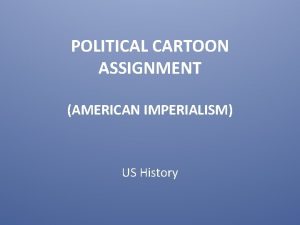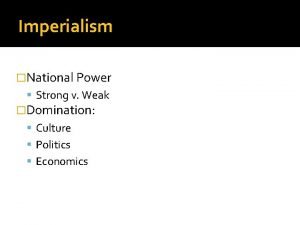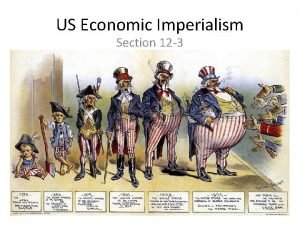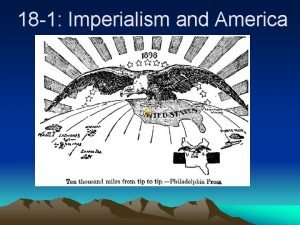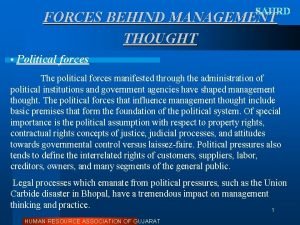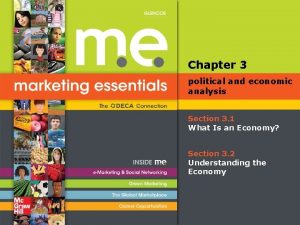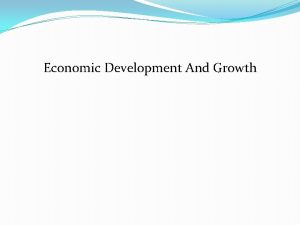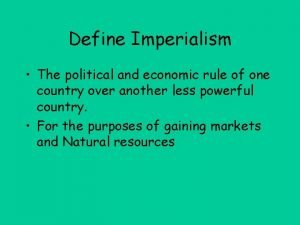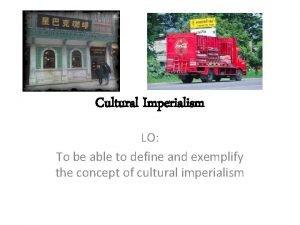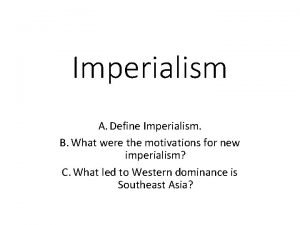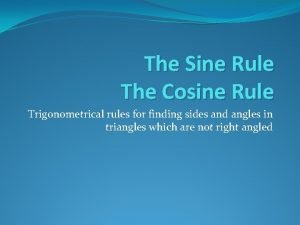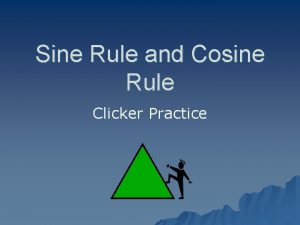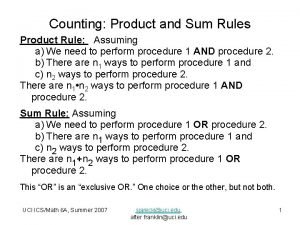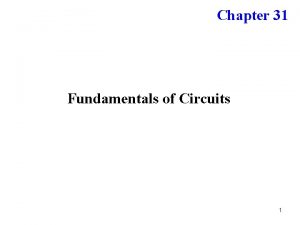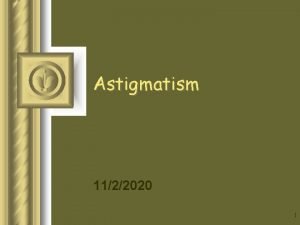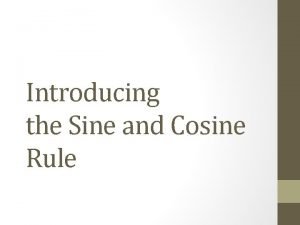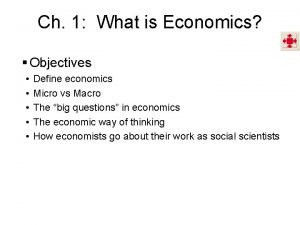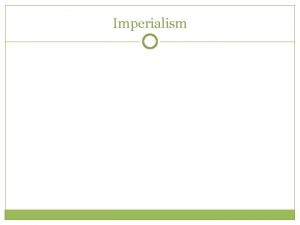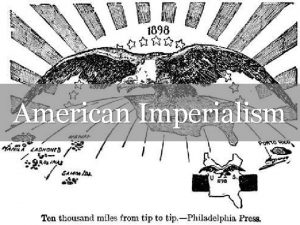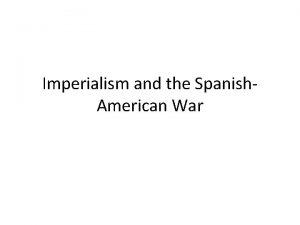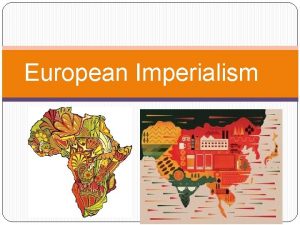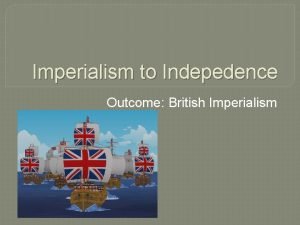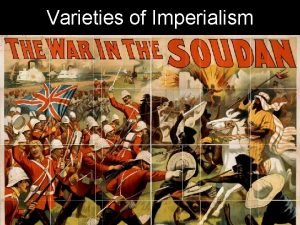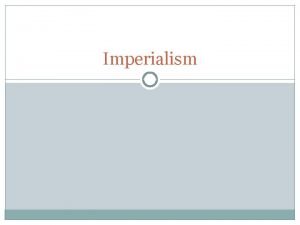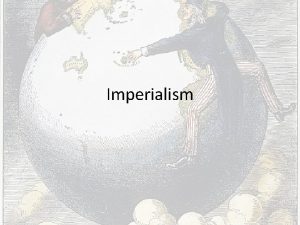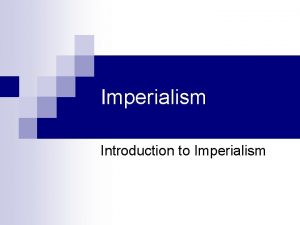Define Imperialism The political and economic rule of














































- Slides: 46

Define Imperialism • The political and economic rule of one country over another less powerful country. • For the purposes of gaining markets and Natural resources

Imperialism Reasons for Imperialism • Military or Strategic Interests • Commercial & Business Interests • Ideas of Social Darwinism • Religious or Missionary Interests • Closing of the Frontier

Alaska-1867 Seward’s Folly Hawaii-Queen Lil out Spanish- American war Markets and Natural Resources Panama Canal Roosevelt Corollary

William Seward

Western Hemisphere Monroe Doctrine

Alaska

Pipeline

Info on the pipeline • The Trans-Alaska Pipeline System was designed and constructed to move oil from the North Slope of Alaska to the northern most ice- free port- Valdez, Alaska. • Length: 800 miles. • Diameter: 48 inches. • Crosses three mountain ranges and over 800 rivers and streams. • Cost to build: $8 billion in 1977, largest privately funded construction project at that time. • Construction began on March 27, 1975 and was completed on May 31, 1977. • First oil moved through the pipeline on June 20, 1977. • Over 14 billion barrels have moved through the Trans Alaska Pipeline System. • First tanker to carry crude oil from Valdez: ARCO Juneau, August 1, 1977.

Exxon Valdez

Alfred T. Mahan

Alfred T. Mahan • The Influence of Sea Power Upon History

Queen Liliuokalani

Finally on January 17, 1893, the Queen faced the inevitable and surrendered under protest. On January 31, Minister Stevens, at the request of the Provisional Government's advisory council, raised the U. S. flag over Honolulu. Annexation was thought to be a mere formality. President Cleveland's administration concluded that the monarchy had been overthrown by force with the complicity of the U. S. minister.

James Drummond Dole “The Pineapple King”

Pineapples

Hawaii

Empire • Crucible Of Empire: The Spanish American War

Political Monroe Doctrine Open Door policy Roosevelt Corollary Dollar Diplomacy “Spheres of Influence” Economic Open Door Policy Purchase of Alaska Boxer Rebellion “Yellow Journalism” Social Darwinism Joseph Pulitzer William R. Hearst de. Lome letter

Spanish-American War • Humanitarian concerns • Yellow Journalism • Economic Interests • De. Lome letter • Sinking of the USS Maine

WAR • In order for America to take its rightful place amongst the worlds power many felt we needed to control a vast imperial empire. This empire would provide a market for our goods, raw materials for our factories and protection for our commercial interests. The expansion was, as previously discussed, justified by the need for our people to expand commercially and the social Darwinist idea of the white man's burden. With this need in mind eyes turned towards Spain, a once mighty empire, still with vast colonial holdings many of them in our Caribbean backyard, was now a much weaker nation than us. They were ripe for the picking and a their imperial holdings would be the spoils of victory.

• I. The Spanish American War • A. What caused an increase in tension between the United States and Spain? • 1. In 1895 civil war broke out in Cuba between Spain and the Cubans. • 2. The conflict was described by Senator Redfield Proctor of Vermont as bloody and brutal. • 3. Newspapers (particularly those owned by William Randolph Hearst) reported the brutality of the Spanish General Weyler in graphic and often biased terms. The New York Journal reports ". . . blood on the roadsides, blood in the villages, blood, blood!" American newspapers were clearly pushing the nation towards intervention in the Cuban situation.

B. What event pushed the United States into war with Spain? 1. The De. Lome Letter - A letter by Spanish Ambassador to the United States Enrique De. Lome was intercepted by Hearst's newspaper and published on the front page. The De. Lome letter called President Mc. Kinley ". . . weak and a bidder for the affections of the people. . . a would be politician who leaves a door open behind himself while at the same time trying to appease the jingoes of his party. " (The term "jingo" comes from a term used at the turn of the century to describe one who was intensely nationalistic and often militaristic. ) The De. Lome letter embarrassed Mc. Kinley and brought us one step closer to war.

“Yellow Journalism” • The Sensational Beginnings of Yellow Journalism. In order to increase circulation, the publishers of these papers often exploited their position by sponsoring a flamboyant and irresponsible approach to news reporting that became known as "yellow journalism. "

“Yellow Journalism”

Yellow Journalism • William Randolph Hearst • New York Journal • Joseph Pulitzer • New York World

USS Maine

USS Maine

USS Maine Memorial

Arlington National Cemetery

USS Cole The Attack on the USS Cole in Yemen on October 12, 2000. (Terrorist Attack)

USS Cole

Spanish -American War

Cuba

Philippines

The life of Adm. George Dewey

Rough Riders • In the Summer of 1898, one of America's most famous cavalry regiments, under the leadership of a young man named Theodore Roosevelt, made a historical charge that made men into legends and turned the page of history.

Theodore Roosevelt

Rough Riders

Changing role of the Presidency Roosevelt brings the Presidency into the Modern era.

Panama Canal

Roosevelt Corollary • Extended the Monroe Doctrine • Locked out European nations from collecting on their debts • International police powers

President Roosevelt Treaty of Portsmouth

President Roosevelt • • • International Peace Agreement Treaty of Portsmouth Building of the Panama Canal “Big Stick Policy” Roosevelt Corollary Great White Fleet

“Spheres of Influence”

Open Door

Role of the US Today • ? Iraq • ? North Korea • ? Terrorism • ?
 How were old imperialism and new imperialism similar?
How were old imperialism and new imperialism similar? Old imperialism vs new imperialism chart
Old imperialism vs new imperialism chart What does this image depict?
What does this image depict? American imperialism political cartoons explained
American imperialism political cartoons explained What is the message of this political cartoon?
What is the message of this political cartoon? Economic imperialism in latin america
Economic imperialism in latin america Types of imperialism
Types of imperialism The roots of american imperialism economic roots
The roots of american imperialism economic roots Economic causes of new imperialism
Economic causes of new imperialism Puritans england
Puritans england Geographical forces
Geographical forces Chapter 3 political and economic analysis
Chapter 3 political and economic analysis Chapter 3 political and economic analysis
Chapter 3 political and economic analysis What is direct rule in imperialism
What is direct rule in imperialism Economic growth and development
Economic growth and development Define imperialism
Define imperialism Definition of cultural imperialism
Definition of cultural imperialism Define imperialize
Define imperialize Pest political economic social technological
Pest political economic social technological Economic growth vs economic development
Economic growth vs economic development Chapter 1 lesson 2 our economic choices worksheet answers
Chapter 1 lesson 2 our economic choices worksheet answers When do we use cosine rule
When do we use cosine rule Sine rule and cosine rule
Sine rule and cosine rule Kirchoffs junction rule
Kirchoffs junction rule Rule of sum and product
Rule of sum and product Loop rule
Loop rule With the rule astigmatism
With the rule astigmatism Against the rule astigmatism
Against the rule astigmatism With the rule astigmatism axis
With the rule astigmatism axis Sine rule of triangle
Sine rule of triangle Define political cartoon
Define political cartoon Management economics definition
Management economics definition Define circular flow of economic activity
Define circular flow of economic activity Define circular flow of economic activity
Define circular flow of economic activity Define economic objectives
Define economic objectives Hát kết hợp bộ gõ cơ thể
Hát kết hợp bộ gõ cơ thể Slidetodoc
Slidetodoc Bổ thể
Bổ thể Tỉ lệ cơ thể trẻ em
Tỉ lệ cơ thể trẻ em Gấu đi như thế nào
Gấu đi như thế nào Tư thế worm breton
Tư thế worm breton Chúa yêu trần thế alleluia
Chúa yêu trần thế alleluia Các môn thể thao bắt đầu bằng tiếng chạy
Các môn thể thao bắt đầu bằng tiếng chạy Thế nào là hệ số cao nhất
Thế nào là hệ số cao nhất Các châu lục và đại dương trên thế giới
Các châu lục và đại dương trên thế giới Công thức tính độ biến thiên đông lượng
Công thức tính độ biến thiên đông lượng Trời xanh đây là của chúng ta thể thơ
Trời xanh đây là của chúng ta thể thơ


